Language
Undefined
UN and the Syrian Arab Red Crescent enter Ghouta with enough food for 40,000 people
Language
Undefined
UN and the Syrian Arab Red Crescent enter Ghouta with enough food for 40,000 people
Rassegna stampa italiana ed estera del 30 ottobre 2017
 Anno dopo anno assistiamo al macabro conteggio delle vittime lungo le frontiere del mondo. Soltanto nel Mediterraneo, dalla fine degli anni ’80 al 2017 oltre 35 mila persone migranti sono morte, scomparse o sono state vittime di scomparsa forzata nel tentativo di raggiungere l’Europa.
Anno dopo anno assistiamo al macabro conteggio delle vittime lungo le frontiere del mondo. Soltanto nel Mediterraneo, dalla fine degli anni ’80 al 2017 oltre 35 mila persone migranti sono morte, scomparse o sono state vittime di scomparsa forzata nel tentativo di raggiungere l’Europa.

The exact dates of the presidential visit remained unconfirmed until the last minute, as usual. On October 23, though, Egyptian President Abdel Fattah al-Sisi entered French airspace with great pomp, escorted by several Rafale French fighter jets bearing the tricolor cockade and the Egyptian flag.
Sisi was on his first official visit to Paris since the election of French President Emmanuel Macron. Although the two men had met briefly before — at the 72nd General Assembly of United Nations in New York in September — bilateral relations have mostly been negotiated through their respective ministers, who are by now familiar with one another. Both Jean-Yves Le Drian, the French minister of foreign affairs, and Florence Parly, French minister of the Armed Forces, have already met with the Egyptian strongman and various Egyptian ministers on visits to Egypt over the last few months.
On Sisi’s arrival in Paris, the red carpet was rolled out by none other than Eric Trappier, the CEO of Dassault, manufacturer of the same Rafale aircraft that gave Sisi the guard of honor on his way to Paris, and welcomed the Egyptian president after his arrival on French soil. The enthusiastic businessman also congratulated Egyptian pilots for “their high quality performance,” and for training in “record time” to fly Rafale aircraft.
Sisi met with Parly the day he arrived at the Armed Forces’ headquarters, making reference to the “fruitful cooperation” between the two nations and adding that he eagerly anticipates the development of such collaboration in the future. In the meetings that followed, he reiterated this desire several times — to Hervé Guillou, CEO of the Naval group, to the head of the national railway company Guillaume Pepy, and to the French president himself.
Macron echoed Sisi’s desires for greater collaboration in a joint press conference: “Your presence here in Paris, by my side, is a testimony to the friendship you have for our country, and your busy program […] demonstrates the importance of your visit for France, and the very close cooperation that binds us.”
The two men have amassed an impressive portfolio of joint initiatives: Investment in Egypt’s new Suez Canal passageway, potential contracts for energy diversification, consultancy regarding improving Egypt’s railways, as well as academic and cultural ties.
The postcard is picture perfect. No one could dream of a better diplomatic relationship, right? But what is scribbled on the reverse of the enthusiastic smiles?
The verso of this glowing picture shows at least 60,000 political prisoners, proven cases of torture and sexual violence by Egyptian authorities and security forces, forced disappearances and extrajudicial executions. At least 434 websites have been blocked in Egypt, and the state is waging an ongoing crackdown on LGBTQ individuals, NGO workers, artists, atheists, researchers and journalists. Basically a blacked out square of human rights violations implemented by Sisi’s regime, with no French address to send complaints to.
“Emmanuel Macron should end now this era of indulgence towards Cairo,” Human Rights Watch stressed in a statement on the day of the presidential meeting. “Continuing to support Egypt’s repressive government would betray the country’s brave activists, who face grave risks trying to make their country better,” added HRW France’s director Bénédicte Jeannerod.
The relationship between the two countries in recent years has centered on military and security cooperation and counterterrorism, while France has turned a blind eye to Egypt’s worrying human rights record. Macron defended this position during Sisi’s visit, saying it is not his place to “lecture” Egypt on civil liberties. “I believe in the sovereignty of states and therefore. Just as I don’t accept being lectured on how to govern my country, I don’t lecture others […] My deeply held conviction is that it’s in President Sisi’s interests to address defense and human rights in a way that only he can be the judge of,” the French president said.
France rolls out the red carpet every single time Egypt asks for it, as for this most recent autumnal visit. The dust is, meanwhile, conveniently and repeatedly swept underneath.
After dropping historical ally President Hosni Mubarak and publically supporting Egypt’s January 25 revolution against authoritarian rule, France has again backed Egypt’s military establishment, in the form of Sisi and his generals.
The current French administration has a belief that it must support Egypt in regaining its traditional place as a regional power, says Agnes Levallois, consultant and vice-president of the Iremmo institute. This has been usurped by Saudi Arabia recently, she adds, so the feeling in France is, “Okay, Saudi Arabia plays its role, but it does not have the same cards as Egypt. It does not have the same experience. It does not have the same history to be able to take up this responsibility on its own. Therefore, we must help Egypt.”
This isn’t altruism. Western nations like France need a partner they can rely on in an unstable region, preferably with a strong leader at its head. Egypt shares 1,200 km of its borders with Libya, and is therefore on the front line to block waves of refugees and migrants attempting to enter Europe. Macron’s government, which has made Libya and the influx of refugees from its shores to Europe a major priority, is keen to support and utilize Egypt in this effort.
The motivation is domestic politics, says a French diplomat who spoke on condition of anonymity, adding that Macron spares no expense on Libya because he doesn’t want to be blamed for immigration by his people. The French president forgets, however, that Egyptians are also increasingly trying to leave via their own shores, as illustrated last year when a boat trying to leave from the coast of Rashid sank with a large number of Egyptian passengers. Many refugees coming from the Horn of Africa have also opted to make their journeys to Europe via Alexandria and other Egyptian port cities.
Another hope that France is pinning on bilateral ties with Egypt is that militant cells and individuals will be contained and not spread to Europe. But here too, France is short sighted in imagining such individuals would have to travel through Egypt, or even that the Egyptian regime is managing to influence or reduce their activity. Until recently, this threat was largely confined to Egypt’s North Sinai Peninsula, but militant attacks and operations by security forces have since spread to other areas of Sinai and into the heart of the Nile Valley, the Delta, Upper Egypt and the Western Desert, in its proximity to the Libyan border.
That Egypt is not as strong or stable as authorities would like their French counterparts to believe isn’t particularly an issue in choosing regional allies, as Paris doesn’t see another option, says Agnès Levallois. Supporting Arab leaders willing to fight the immediate threat of militant groups is a shortsighted strategy that France has always had, without consideration for the underlying political issues, she adds.
Commonly described as discreet, cautious and a hard worker, French Foreign Affairs Minister Jean-Yves Le Drian (former minister of defense under François Hollande) is the architect of this play-it-by-ear strategy, and despite the change in French leadership, he has forged ahead his agenda of “assertive political realism,” as described by his collaborators.
“We are employing a short-term strategy,” admit several French diplomats, who spoke on condition of anonymity. Short-term and tinged with cynicism. What we refer to as “realpolitik” in the jargon.
The French minister of foreign affairs visited Egypt for the eighth time in June, officially to offer his condolences following an attack on a bus carrying Copts in Upper Egypt. Having just taken on his new role, Le Drian addressed a crowd of Egyptian journalists and media representatives on the 26th floor of the infamous Foreign Ministry building in Cairo. “It’s not a coincidence that I’m here again,” he said, ignoring hands waving in front of him with questions. Later on he visited with Coptic Pope Tawadros II and hailed the visit a “friendly gesture” towards his Egyptian counterpart. But purely friendly gestures never happen in diplomacy.
The visit was, of course, about more than was officially claimed. For Le Drian, the motivation for his trip was undoubtedly the situation in Libya, with which the minister has been concerned for many years. Sisi had ordered several missions in eastern Libya led by Rafale aircraft after the bus attack. “We cannot let terrorists and traffickers of any kind prosper on Egypt’s borders, at the gates of Europe,” Le Drian said during a press briefing. Libya plays an important role in the progress of peaceful solutions to which Egypt and France are very attached, he added.
Many stones have been placed carefully onto the tower of collaboration during these eight visits. Since 2014, Egypt has signed a US$1 billion deal with France for four warships and a $6 billion deal for 24 Rafale jet fighters. France has also sold weapons and military services to Egypt, including a $700 million military satellite, two Mistral helicopter carriers at $1 billion, originally built for sale to Russia, and rockets, firearms and ammunition amounting to almost $1 billion.
French policies regarding the export of arms are supposedly informed by rights-related regulations, including the December 2008 European Council Common Position that defines eight criteria for arms exports. This includes a requirement that EU countries “deny export licenses if there is a clear risk that the military technology or equipment exported might be used for internal repression,” or for “serious violations of international humanitarian law.” At least 13 EU countries are violating this requirement, including France, despite the EU Foreign Affairs Council urging members to suspend export licenses to Egypt in 2013 and 2014.
All military equipment exported by France has to be authorized by the prime minister. Such talks are classified and confidential, explains Aymeric Elluin, advocacy officer for weapons and international justice at Amnesty International.
“France doesn’t have any obligation to provide a public report on why certain exports were made or not,” he says, adding that Amnesty has one request: That the French government reveals what its reasons are for continuing to export military equipment and services to Egypt.
“It is time for French diplomats to stop playing VRP weapons manufacturers at the risk of seriously violating the provisions of the Treaty on the Arms Trade, ratified by Paris in 2013, and of international law more generally,” says Dimitris Christopoulos, director of FIDH. “If France is to maintain a ‘privileged’ relationship with Egypt, it can only continue in a climate of transparency, and any trade agreements must be conditional on a strict respect for human rights.”
Meanwhile, more stones are being added to the pile and Egypt’s shopping list is growing. Sisi raised the matter of acquiring 12 new Rafale aircraft, telecoms satellites and new Falcon aircraft during his latest trip to Paris.
“Amnesty International’s research has shown that armored vehicles exported by the US and France were used to facilitate extra judicial executions and the unlawful killing of protestors,” says Aymeric Elluin. The Egyptian military has also carried out a number of operations against armed groups in North Sinai with armored vehicles, tanks, Apache helicopters and F-16 aircrafts. HRW has published evidence showing that civilians are often victimized during such operations.
“President Macron should refuse to continue France’s disgraceful policies of indulgence toward Sisi’s repressive government,” Benedicte Jeannerod from HRW says.
The French obsession for “security everywhere” has had the effect of making Paris ignore its grievances with Egypt and its need for answers. The investigation into the crash of aircraft MS804 was stalled after a year and a half. Cairo tried to blackmail Paris into claiming the crash was the result of a terrorist attack, with no evidence to support such a claim. France even sent a number of diplomats to attend a tribute ceremony to the victims in Egypt, despite their families’ refusal to participate.
Also stalled with no resolution is an investigation into the death of French teacher Eric Lang, who died in an Egyptian police station in 2013, reportedly killed by his cellmates with encouragement from their jailers. Neither was there any official explanation for the death of Cécile Vannier in 2009 in a terrorist attack in Cairo, or for the deporting of a French journalist in spring 2016.
French authorities explain this lack of follow up through the current administration’s policy of not openly criticizing other nations for their human rights records, and maintaining that private diplomacy is more effective in solving such cases.
But, according to a French senior diplomat, who spoke on condition of anonymity, many senior French officials, including Macron, don’t really understand the Middle East, and those who do are not often heard. There have been small improvements recently, as members of the French delegation at least remembered who they had met in Egyptian rights organizations on their return from Cairo to Paris last time.
The policy is to satisfy French commercial interests, even if they contradict regional interests, and even though Egypt is on a financial drip from Gulf countries and pays on credit.
The two countries also prefer to exchange medals of honor on the sly. Le Drian was publicly recognized last February in Cairo for his contribution to an “unprecedented boom” in military cooperation, according to a statement from the Egyptian presidency. Sisi decorated him with “the order of the Republic of the first category.” In exchange, Le Drian awarded the Egyptian minister in charge of military production, Mohamed al-Asar, “Commander of the Legion of Honor” — the highest French distinction for his role in strengthening relations between France and Egypt. Asar is among a few ministers who has remained in government since the days of Mubarak. He has been accused of having a hand in the Maspero massacre in October 2011. Asar’s award is not listed in the registers of the Legion d’Honneur. When asked about this, an employee merely remarked that some medals exchanged between officials don’t appear publicly in the listings.
In recent years, France’s relationship with Egypt has been developed for the sake of fighting terrorism, preventing unwanted migrants from arriving on European coasts and agreeing arms deals. But does this relationship have any benefits besides contributing to the legitimation of a repressive power? Absolutely not, and many Egyptians are well aware of this. During Sisi’s French visit, Egyptians commented on social networks: “Shame on you France,” and the “France of Macron is an international disgrace.”
A youth panel on non-violence, organized by the Iraqi Social Forum and the Iraqi Civil Society Solidarity Initiative
Baghdad – October 2017
On 21 October, in a unique event in Baghdad, the Baghdad La-Onf group, which works closely with the Iraqi Social Forum to promote nonviolent principles and action, organized their first youth panel. The panel gave individuals the opportunity to share their own success stories in nonviolence and peace-building through art, sport and social networking. The event was held in Karrada, the heart of Baghdad, in celebration of the International Day of Nonviolence and the birth of the leader, Gandhi.
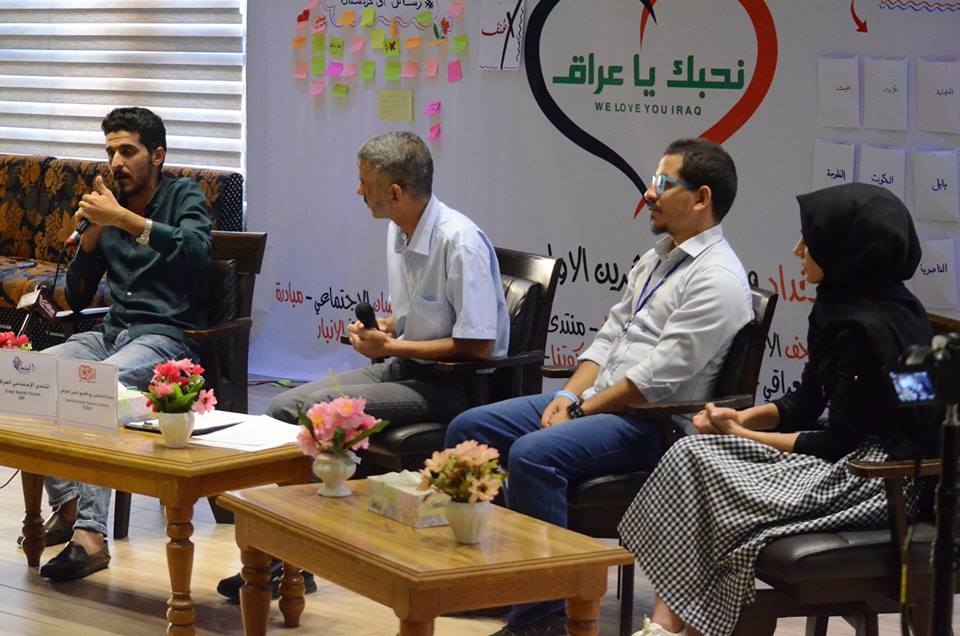
The talk show presented many different experiences from young people who engaged in nonviolent actions as a way to rebuild peace in Iraq. The show included theatrical and musical performances as well, and highlighted the way these young activists are working actively to change social reality through personal effort and cooperative volunteer work.
At the start of the show, Mahmood al-Hiti, an activist from the Shakoufyan Initiative active in Hit, presented his experience of peace-building as he and a team of volunteers worked to rehabilitate a number of schools in the city for the returnees after the liberation of Hit from Daesh.
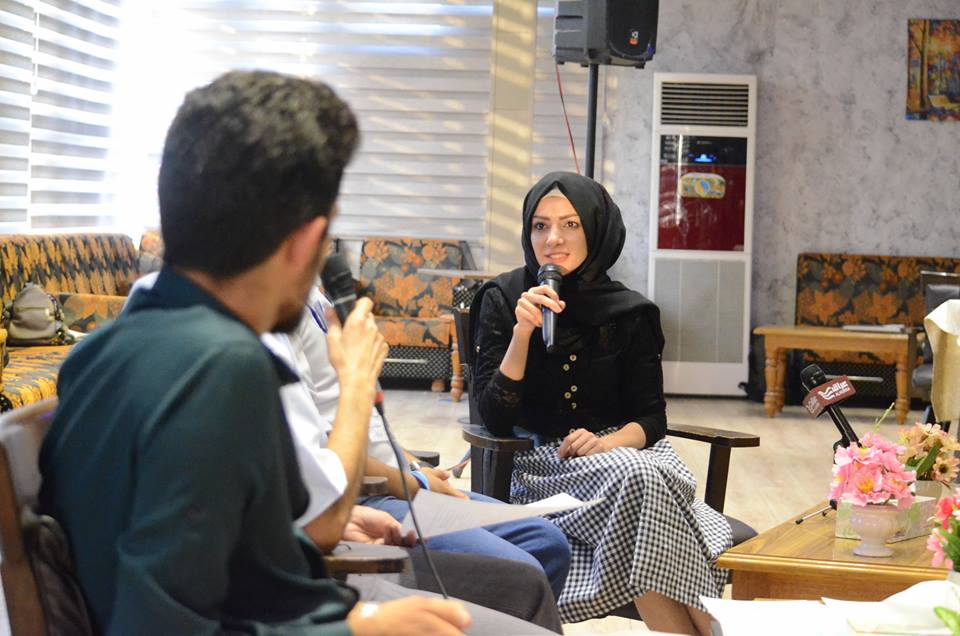
Bara, part of the Sports Against Violence team in Iraq, presented her experience helping to organize a range of sports activities, and explained the positive impact of those activities on both members of the team and on the broader community.
Salman Khairallah described his work with the team, Humat Dijlah, and their efforts to protect the Tigris River. He stressed the importance of preserving the environment and protecting bodies of water for these are elements that contribute directly to the stability of the community. A flourishing natural environment contributes to peace-building, and builds solidarity among the residents of those cities through which the Tigris and Euphrates rivers flow.
Rawan, the youngest participant in the talk show, shared her experiences of volunteer work with her father in the city of Babylon. Together they put a smiles on the faces of children, showing them how to change their lives for the better by giving them greater opportunities for their futures. More specifically, with a volunteer team, Rawan helps displaced children and fights for children’s rights, and led more than 200 children in a demonstration calling for the right of Iraqi children to live decent lives. The volunteers have also organized campaigns promoting music and reading. Rawan is also working on a humanitarian project to help 150 displaced children in her hometown who fled from Daesh. In the future, she hopes to establish a children’s parliament to ensure children’s voices are heard.
The Mashofna team from Nasiriyah put on a theatrical performance about the protection of migratory birds and aquatic life in the marshes of Iraq, in which they warned of the dangers of overfishing, and raised awareness about the need to preserve biological diversity within the marshes.
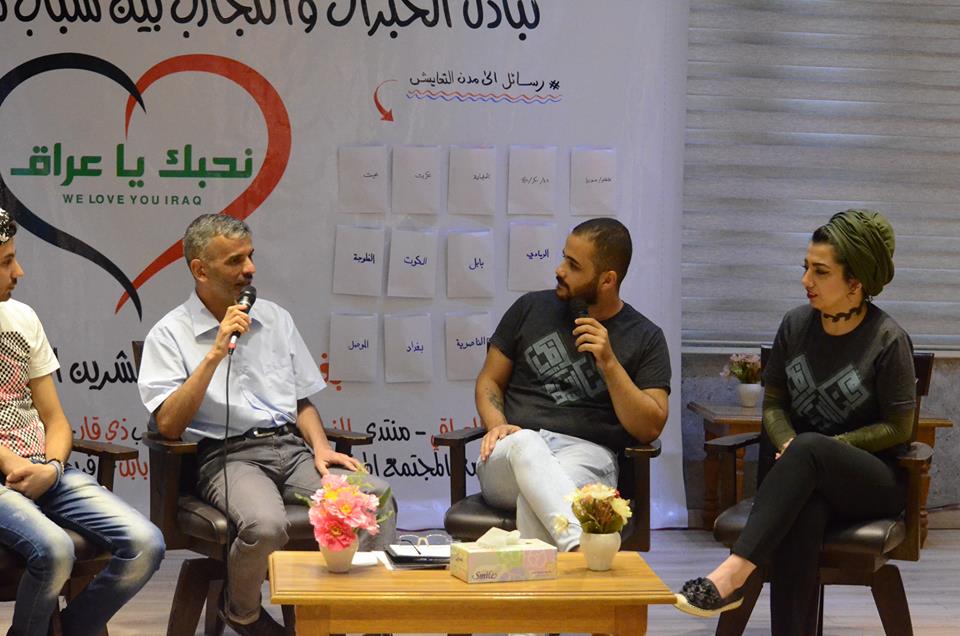
Fatima and Hassan shared their beautiful story about their volunteer team called ‘Baghdad City of Peace’. Every year, this team organizes a special festival to celebrate International Peace Day in Baghdad. They spoke of their efforts to spread word of their festival through social networking sites, in hopes of reaching other volunteers in governorates beyond Baghdad who might put on festivals as well. And in fact, many youth teams in the other Iraqi cities were able to organize festivals that promoted beauty and art, thus helping to change the image of Iraq as a country of war and destruction.
Ahmed Abdul Salam, member of HHU, a rap group from the city of Hit, shared his experience of positive rap, and how his band was launched from the Upper Euphrates. He spoke of the prospects for the development of this art within the youth community.
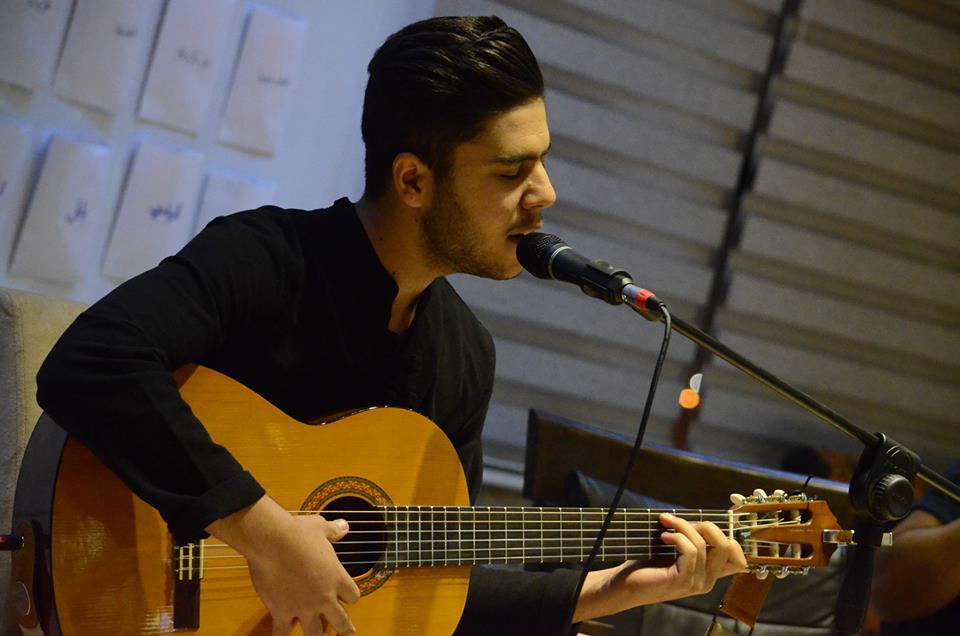
The talented musician Hussein Samah from Diyala city shared his experience of how he managed to transcend the image of blood and destruction with his dear friend, the Piano, and talked about his dreams and his message to re-present sophisticated music and singing to the younger generation.
The show ended with a performance of a rap song by Ahmed from HHU band, as well as the number of beautiful songs that dazzled the audience by Hussein Samah, ending with Ali Taqi, who presented “beat box” show with the rapper Ahmad.
The Baghdad Nonviolence Team presented this event within the space of the Iraqi Social Forum, in collaboration with Sawtona Organization, Information Center for Research and Development, the Italian Organization Un Ponte Per… and the Iraqi Civil Society Solidarity Initiative, as part of a project funded by the Swiss FAI Foundation. The aim was to disseminate experiences and success stories of youth groups that contribute to the spread of nonviolence and promote peace, igniting youth energy that looks to the future with optimism and believes that ‘Another Iraq is Possible’.
Language
Undefined
Grand imam demands ban of ‘With Islam,’ presented by controversial intellectual reformer Islam Behairy
Language
Undefined
Truck driven by suicide bomber explodes when elite forces enter Mahfad, killing one soldier, wounding five

Lors du forum économique Future Investment Initiative qui s’est déroulé à Riyad du 24 au 26 octobre, l’Arabie saoudite a accordé la citoyenneté à un robot. Une première dans le monde, qui n’est pas sans provoquer une certaine polémique.
La coalition internationale dirigée par les États-Unis a découvert et détruit des armes chimiques utilisées par le groupe terroriste Etat islamique sur le territoire de la Syrie et de l’Irak, a déclaré le porte-parole de la coalition internationale dirigée par les Etats-Unis.

En visite au Yémen, Mark Lowcock, responsable de l’aide humanitaire aux Nations unies, dénonce une situation alarmante dans le pays. C’était la première visite de ce haut responsable de l’ONU, en poste depuis seulement deux mois, dans cet Etat ravagé par la guerre.

En Egypte, le chef d’état-major des armées ainsi que le chef de la direction de la sécurité nationale ont été remplacés samedi 28 octobre à l’issue d’une réunion du président Abdel Fattah al-Sissi avec les ministres de la Défense et de l’Intérieur ainsi que des chefs des services de renseignement. Des changements liés à l’embuscade tendue par des jihadistes et qui avait officiellement coûté la vie à 16 policiers dans les oasis vendredi 20 octobre.

A l’issue de la trêve de 24h accordée par le Premier ministre irakien aux forces kurdes, des représentants des deux forces ont affirmé avoir fait un pas en avant vers un accord définitif entre le gouvernement national et le gouvernement de la région indépendantiste.
 Questo articolo sui Rohingya è stato scritto per la rivista Gli Asini*
Questo articolo sui Rohingya è stato scritto per la rivista Gli Asini*
La maggior parte delle volte le storie di confine sono drammatiche. Dove un cartografo disegna una frontiera, approfittando di un fiume, di una catena montuosa o semplicemente tracciando una linea retta su un territorio che la mappa geografica rende asettico, vivono persone e animali e si dipana la storia infinita della biodiversità. La geopolitica tiene poco in conto le persone (gli animali e la biodiversità) ed è semmai attenta alla proprietà (se è in mano a uomini potenti) o ai prodotti della terra, siano essi agricoli o fossili. Le vicende che in questi giorni hanno a che vedere con la fuga dal Myanmar verso il Bangladesh di 500mila rohingya, una minoranza musulmana che vive (o meglio viveva) nello Stato birmano del Rakhine, hanno molto a che vedere con la storia di un confine – quello tra il mondo birmano e quello bengalese – che nei secoli si è spostato, cambiando di mano e di segno in seguito a guerre, dispute, cambi della guardia al vertice dei poteri che, di volta in volta, hanno comandato su questi territori.
Tutti conoscono la storia di violenze che i rohingya subiscono dal 2012, quando il primo pogrom recente (la persecuzione ha radici antiche) ha prodotto oltre centomila sfollati interni. Allora pareva soprattutto una vicenda di intolleranza religiosa alimentata da gruppi identitari buddisti che vedevano nei rohingya, considerati non birmani e immigrati bengalesi per di più musulmani, un pericolo per l’integrità di un Paese che è stato la culla del buddismo. Nel 2016 una nuova ondata di violenze si doveva nuovamente abbattere su quel milione di rohingya ancora in possesso di una casa e un campo da coltivare o una capra da mungere. L’attacco di un gruppo secessionista ad alcuni posti di frontiera scatena una reazione che produce allora un esodo di circa 80mila persone verso il Bangladesh. Passato qualche mese, nell’agosto di quest’anno, in seguito a un altro attacco dell’Arakan Rohingya Salvation Army (Arsa), una nuova spropositata reazione dell’esercito (sono parole dell’Onu che non ha esitato a utilizzare anche la locuzione “pulizia etnica”) ha invece prodotto un nuovo massiccio esodo di circa mezzo milione di profughi. A far le somme, e considerato che ormai la diaspora di questa comunità conta nel mondo quasi due milioni di persone, non solo la maggioranza dei rohingya risiede ormai all’estero (oltre un milione nel solo Bangladesh) ma i numeri di questa popolazione nel Myanmar sono ormai così ridotti che la scomparsa dei rohingya dai territori birmani è ormai forse solo questione di qualche anno. Forse di mesi.
Cosa c’entrano in tutto ciò le frontiere e la loro eredità?
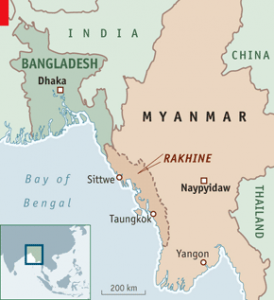 |
| Il Rakhine oggi, area birmana. Cosa è stato nei secoli? |
Dobbiamo fare un passo indietro. Fino al 1700 l’Arakan, l’attuale Stato birmano del Rakhine, era un regno indipendente che alla fine di quel secolo doveva finire sotto i monarchi birmani. I birmani però volevano espandersi sempre più a Ovest ed entrarono in conflitto con le mire di Calcutta, la capitale della British India, che voleva invece allargarsi sempre più a Est. Sono però i birmani a perdere e nel 1824 – in seguito al trattato di Yandabo che conclude la prima guerra anglo-birmana – l’Arakan e altri territori sotto influenza birmana passano sotto l’India britannica. I rohingya, chissà da quanto tempo nell’Arakan, si ritrovano dunque, dall’essere stati sudditi di un regno indipendente prima e delle monarchie birmane poi, a diventare vassalli di Sua Maestà britannica, o meglio dell’amministrazione coloniale della Regina in India. Nei primi mesi del 1886 l’intera Birmania diventa una provincia dell’India britannica e nel 1887 diventa sede di un vice governatorato che solo nel 1937 passa direttamente a un’amministrazione separata, sotto la direzione del Burma Office di Londra (segretariato di Stato per l’India e la Birmania). Dunque i rohingya sono adesso sudditi britannici sotto un’altra formula e lo saranno sino al 1948 quando la Birmania, come la chiamavamo allora, diventerà indipendente. C’è anche da notare che, seppur brevemente, i rohingya, come i birmani, sono stati anche sudditi dell’Imperatore Hirohito – dal 1942 al 1945 – quando le forze nipponiche dell’Asse avevano invaso la Birmania per “liberarla” dal giogo coloniale britannico con la parola d’ordine “L’Asia agli asiatici”. In poche parole, più che essere i rohingya a spostarsi (cosa sicuramente avvenuta in passato nel corso di quel flusso migratorio universale che ha interessato e interessa tutti i popoli del mondo che si muovono per i più svariati motivi), sono stati i confini a tendersi o contrarsi come un elastico. La sola colpa dei rohingya, vine da dire, è quella di essere sempre stata una minoranza debole, non in grado di far sentire la propria voce.
Ora, le legge sulla cittadinanza del Myanmar, varata durante la dittatura militare nel 1982, riconosce tre categorie di cittadini: cittadini propriamente detti, associati o naturalizzati. Ma i rohingya non sono riconosciuti in nessuna delle categorie. La legge dice che, come recita la Costituzione del 1947, è cittadino birmano chi ha radici in una “razza indigena” o viveva nella “British Burma” prima del 1942, ossia prima dell’arrivo dei giapponesi. A quell’epoca chi abitava nell’Arakan era già da tempo sotto dominio britannico: un dominio strappato ai birmani e ancor prima a un regno indipendente aracanese. Autoctoni o meno dell’Arakan-Rakhine, nel 1942 la presenza dei rohingya nel Rakhine – che questi ultimi chiamano Rohang – datava probabilmente da secoli. E comunque, al di là delle polemiche sul termine “rohingya” che alcuni storici birmani dicono sia apparso solo negli anni Cinquanta del XX secolo, nel 1942 erano stati già stati sudditi britannici ben due volte: in un primo tempo sotto Calcutta (e dal 1911 Delhi) e in seguito direttamente sotto l’Ufficio Birmania a Londra. Benché sia certo che durante la dominazione britannica molte popolazioni, tra cui i bengalesi, si siano mosse all’interno dell’Impero, cosa è successo prima e durante gli inglesi? Non è difficile immaginare che nei secoli vi sia stata una sorta di osmosi tra le pianure e le colline del Bengala e le limitrofe aree birmane. E se è difficile determinare quando il primo rohingya sia nato e dove, si perde nella notte dei tempi la loro presenza (e quella più in generale musulmana) in un’area che un tempo confini non ne aveva affatto: tutt’al più fiumi, mari, colline o catene montuose. Barriere naturali geografiche che la Storia deve aver visto attraversare più volte, in questa o quella direzione: dal cacciatore nomade al pescatore, dal pastore transumante allo stesso agricoltore sedentario in cerca di luoghi dove eleggere domicilio.
Questa legge è dunque una cattiva legge – imperfetta, astorica, obsoleta e ingiusta – e andrebbe
 |
| Terrore buddista. Un’analisi sufficente? |
riformata anche perché originariamente i rohingya avevano assai più diritti: potevano votare e candidarsi. Al netto delle colpe del governo civile birmano non si può dimenticare che proprio nei giorni del pogrom di fine agosto, l’ex segretario generale dell’Onu Kofi Annan, incaricato da Aung San Suu Kyi, lo abbia detto a chiare lettere alla conclusione di un’inchiesta svolta proprio per affrontare la questione rohingya, un nome che in Bangladesh non si può nemmeno menzionare. Ma i militari, autori delle peggiori leggi del Paese, non solo non vogliono riconoscere il lavoro di Annan, che hanno definito “fazioso” e dunque falso, ma hanno spinto i partiti d’opposizione al governo di Suu Kyi, nato dalle elezioni del 2015 (con la vittoria della Lega nazionale per la democrazia), a una campagna contro il dossier Annan che ha tutta l’aria di una minaccia. La minaccia è che, se Suu Kyi, il suo partito e il suo governo dovessero tirare troppo la corda, i militari potrebbero ricorrere a un altro articolo della Costituzione, emendata dai generali nel 2008, che prevede (oltre a una quota a loro riservata in parlamento di un quarto dei seggi) che l’esercito possa ribaltare il governo in carica nel momento in cui esiste un pericolo reale per la stabilità del Paese. Il richiamo dell’opposizione a un dossier definito un’operazione che favorisce le forze straniere che minacciano il Myanmar non è, in altre parole, che la proiezione sulla situazione attuale dell’ombra di questo emendamento. Che garantisce un golpe costituzionale, dunque legittimo. Se finora non si è verificato è solo perché i militari controllano tre dicasteri chiave: Interno, Difesa, Frontiere.
 |
| Aung San Suu Kyi: immagine tratta da BigThink |
E’ questo il motivo per cui una paladina dei diritti umani e Nobel per la pace come Aung San Suu Kyi, e così i vertici del suo partito, sta tanto attenta a come parla (non li chiama rohingya ma semplicemente musulmani) e a cosa fa (oltre alla commissione Annan ne ha nominate altre ma con limitatissimo potere) a costo di attirarsi le ire del mondo intero. I militari vegliano sul Paese e, nel consesso internazionale, ci pensa Pechino – e in parte Mosca – a frenare eventuali prese di posizione del Consiglio di sicurezza (che finora ha adoperato un gergo assolutamente debole). Infine c’è l’India, non più britannica ma retta da un campione anti musulmano come Narendra Modi. Che, non solo ritiene al pari di Pechino il Myanmar un partner strategico ma che vorrebbe espellere tutti i rohingya immigrati in India (circa 40mila).
C’è un’ultima domanda ancora senza risposta. Perché? Basta una legge restrittiva? Una sorta di suprematismo buddista? Forme di xenofobia etnica e religiosa? C’è altro e ci sono altre leggi su cui merita soffermarsi. Le immagini satellitari diffuse recentemente da Human Rights Watch e da Amnesty International su vaste aree incendiate nella zona rohingya dello Stato del Rakhine riportano alla memoria fotogrammi più antichi come quelli con cui Hrw aveva stimato, nell’autunno scorso, ad almeno 1500 gli edifici dei rohingya dati alle fiamme. Adesso, dicono all’organizzazione internazionale, non ci sono evidenze per poter dire chi ha appiccato gli incendi, se siano dolosi o provocati dal conflitto, ma è certo che la scia di fuoco si estende su una lunghezza di circa 100 chilometri, lungo tutte le aree delle tre township di Maungdaw, Buthidaung e Rathedaung, unità amministrative dello Stato del Rakhine dove vive la maggioranza dei rohingya o quel che ne rimane.
Quei fotogrammi, ieri come oggi, rendono più chiaro non solo un processo di espulsione che ha a che vedere col razzismo e la fobia religiosa ma anche con l’ipotesi che, dietro alla cacciata di persone senza cittadinanza, ci sia anche un piano per accaparrarsi la loro terra. In un articolo pubblicato sul Guardian all’inizio del 2017, la sociologa Saskia Sassen ricordava che dagli anni Novanta il governo dei generali ha portato avanti nel Paese una politica di requisizione di terre considerate mal sfruttate per affidarle a grosse compagnie private al fine di metterle a profitto. E’ quello che – in altri termini – si scrive “sviluppo” ma si legge “land grabbing” a beneficio di società con grandi mezzi. Dal 2012 un nuovo pacchetto legislativo ha ulteriormente favorito i grandi agglomerati che gestiscono fino a 20mila ettari e che ora possono anche aprirsi al capitale estero sempre affamato di terra. E’ un vero assalto sia alla foresta, che ogni anno perde 400mila ettari, e a piccoli appezzamenti di terreno o ad aree di utilizzo consuetudinario. Col vantaggio che questa legge ne ha anche abolita un’altra del 1963 che difendeva i piccoli agricoltori. Nella zona dei rohingya il passaggio di mano conterebbe ora oltre un milione e duecentomila ettari con un balzo rilevante rispetto ai primi 7mila che furono ceduti durante il pogrom del 2012. Se si mettono assieme le due cose, l’aspetto razzista e islamofobico passa in secondo piano e sembra semmai una concausa benché con radici antiche che risalgono al periodo coloniale e forse anche a prima.
E’ una lettura naturalmente ma non priva di suggestione anche se, in settembre, le tesi della Sassen,
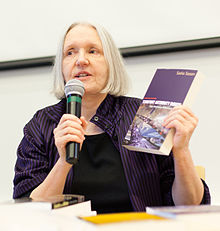 |
| Saskia Sassen |
riprese anche da un gruppo di ricercatori (Forino, von Meding, Johnson) sulla rivista britannica The Conversation, sono state duramente criticate sul sito NewMandala – e tacciate di “marxismo volgare” – da Lee Jones, un noto esperto di cose birmane (su land grabbing e legislazione birmana si può comunque vedere il sito https://library.ecc-platform.org). Ciò che per altro merita una riflessione è il fatto che chi se ne va perde ogni diritto, persino quello della consuetudine. E se non ha cittadinanza e passaporto non avrà mai più, ammesso che possa tornare nel Myanmar, un documento valido per reclamare la sua terra e la sua casa. Qualcuno, non casualmente, l’ha definita una politica della “terra bruciata”. Bruciata oggi perché domani cambi di padrone. Una storia di frontiere e confini. A danno di uomini, animali, biodiversità.
* Con cui sono onorato di collaborare
Il ministro degli Esteri americano ha annunciato che la fine degli Assad è vicina. Dovremmo davvero credere alle sue parole?
L’articolo Quale sarà il piano di Tillerson contro la famiglia Assad? sembra essere il primo su Arabpress.
Essere un editore e un libraio in Libia non è affatto semplice ora. Né, a dirla tutta, lo è stato negli ultimi 60 anni. A raccontarlo sul numero di autunno di Index on Censorship (l’articolo, a firma di Charlotte Bialey, è stato ripreso da Literary Hub) è Ghassan Fergiani, erede di una famiglia di librai […]![]()
Apri un sito e guadagna con Altervista - Disclaimer - Segnala abuso - Privacy Policy - Personalizza tracciamento pubblicitario